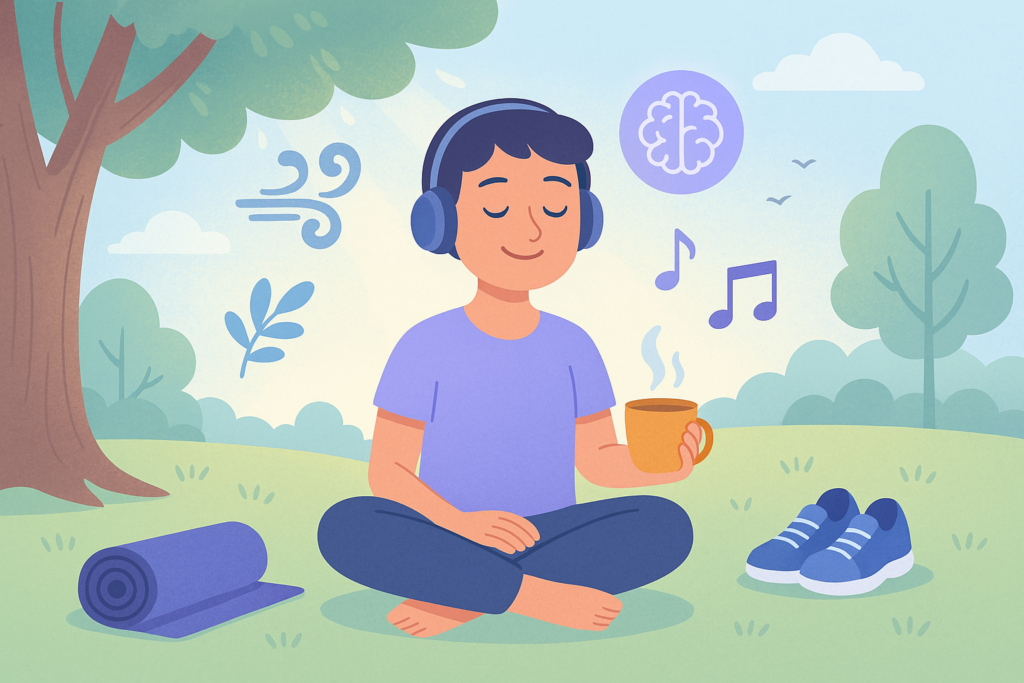Mental health issues often creep in silently. Before the emotional outbursts or breakdowns, subtle signs begin to emerge—easily overlooked or mistaken for stress or fatigue. In a fast-paced society where everyone is juggling responsibilities, it’s common to ignore early symptoms that signal deeper mental health struggles. However, recognizing these early indicators is not only possible—it’s essential.
This article will guide you through the early signs of mental health struggles and equip you with actionable tools to detect and address them early. From changes in behavior and mood to physical symptoms and social withdrawal, we’ll explore what to look for, when to be concerned, and how to support yourself or someone else. Whether you’re a caregiver, friend, or individual seeking answers, understanding these signals can be a crucial step in fostering well-being.
1. Behavioral Changes You Shouldn’t Ignore

Changes in behavior are often the earliest and most visible signs of mental health struggles. These shifts may seem minor at first—like losing interest in social activities or struggling with daily routines—but they often reflect internal emotional distress that shouldn’t be overlooked.
Withdrawal from Social Interaction
Social withdrawal is one of the clearest early signs of emotional difficulty. Individuals may start avoiding gatherings, stop responding to messages, or seem disinterested in conversations they once enjoyed. This is often a coping mechanism driven by feelings of overwhelm, anxiety, or low self-worth.
📌 Did You Know?
People experiencing early signs of depression often withdraw socially weeks or even months before being clinically diagnosed.
Drop in Motivation and Productivity
A noticeable decline in motivation—whether at work, school, or in personal tasks—can indicate the onset of mental health challenges. These changes aren’t just about laziness; they may signal cognitive fatigue, emotional burnout, or depressive symptoms.
Example: A high-performing student who suddenly begins missing deadlines or shows erratic academic performance may be silently battling anxiety or depressive episodes.
Increased Irritability or Emotional Reactivity
Irritability is often mistaken for stress or personality flaws. However, when irritability becomes frequent or uncharacteristic, it can reflect inner psychological strain. You might observe unexpected outbursts, sarcasm, or a defensive tone in ordinary conversations.
✅ Expert Summary
Dr. Samantha Russo, a clinical psychologist specializing in early intervention, emphasizes:
“Behavioral changes, particularly withdrawal and irritability, are protective red flags. They’re the brain’s way of signaling emotional overload—like a silent cry for help before louder symptoms emerge.”
2. Emotional and Psychological Red Flags

Emotional instability and psychological tension often precede diagnosable mental health conditions. Recognizing these internal symptoms early can prevent escalation and open pathways to healing.
Persistent Feelings of Sadness or Emptiness
It’s normal to feel down occasionally, but when sadness lingers for more than two weeks or becomes pervasive, it’s no longer situational—it may signal clinical depression or dysthymia. People experiencing this may describe it as a “numbness” or “hollowness” that doesn’t go away.
💡 Quick Tip
If sadness is paired with sleep changes, appetite loss, or hopeless thoughts, it’s time to consult a mental health professional.
Chronic Anxiety and Overthinking
Excessive worrying, racing thoughts, or constant mental “looping” are classic markers of generalized anxiety disorder (GAD) or even obsessive-compulsive tendencies. These often manifest subtly—such as double-checking tasks repeatedly or struggling to make simple decisions.
Real-world scenario: A parent becomes fixated on minor health symptoms in their child, experiencing daily panic that something is seriously wrong despite medical reassurance.
Loss of Interest or Pleasure (Anhedonia)
When individuals stop enjoying activities they once loved—be it music, cooking, sex, or social games—it may indicate early-stage depression. Anhedonia reflects a disconnection in the brain’s reward system and should never be ignored.
Emotional Red Flags Infographic
| Symptom | Possible Cause | Action Step |
|---|---|---|
| Persistent sadness | Depression, grief | Journal and consult a therapist |
| Chronic anxiety | GAD, OCD, trauma | Practice mindfulness, seek help |
| Loss of interest | Depression, burnout | Reconnect gradually, get evaluated |
| Excessive guilt | Low self-worth, PTSD | Cognitive behavioral therapy (CBT) |
Alt Text: Emotional symptoms like sadness, anxiety, and loss of pleasure may indicate early mental health struggles.
3. Physical Symptoms That Reveal Mental Health Struggles

Mental health is deeply interconnected with physical well-being. The body often becomes a messenger of psychological distress, translating emotional pain into tangible symptoms. Unfortunately, many people chase physical treatments without realizing the root cause is mental or emotional.
Unexplained Aches and Pains
Chronic headaches, muscle tension, or gastrointestinal discomfort (e.g., IBS) are often the physical expression of mental strain. When medical exams reveal no clear cause, the issue may stem from anxiety or depression.
Source: According to the National Institute of Mental Health (NIMH), somatic symptoms are common in depression and anxiety, especially in primary care settings.
NIMH – Chronic Pain and Mental Health
Sleep Disturbances (Insomnia or Oversleeping)
Insomnia can indicate heightened anxiety, while oversleeping may signal depression. Both are signs that the body is dysregulated and unable to maintain a natural rhythm due to emotional burden.
📌 Did You Know?
Over 75% of people with depression report some form of sleep disturbance, either difficulty falling asleep or excessive daytime fatigue.
Sudden Weight Changes
Rapid weight gain or loss can result from emotional eating, stress-related cortisol changes, or appetite suppression due to anxiety or sadness. It’s often misdiagnosed as a metabolic issue when in fact it may be psychological.
✅ Expert Summary
Dr. Rina Patel, MD, psychiatrist and neuroscientist, explains:
“The brain and body are in constant dialogue. Chronic back pain, fatigue, and even skin flare-ups can be your body’s way of expressing emotional overwhelm—especially when no physical cause is found.”
4. Cognitive and Concentration Problems

Mental health struggles don’t just affect emotions—they often interfere with how the brain processes information. Cognitive symptoms can be early warning signs of anxiety, depression, or neuropsychiatric conditions and frequently precede formal diagnoses.
Difficulty Focusing and Mental Fog
People struggling mentally often describe an inability to think clearly. This “mental fog” manifests as difficulty sustaining attention, poor memory recall, or struggling to follow conversations. It’s commonly associated with anxiety and depression, but can also point to early signs of ADHD in adults.
Example: A professional starts rereading the same email multiple times before understanding it. Tasks that once took minutes now feel exhausting and overwhelming.
Memory Lapses and Forgetfulness
Occasional forgetfulness is normal—but frequent lapses (forgetting appointments, names, or basic routines) may signal that the brain is under emotional stress. Depression in particular is known to disrupt working memory and short-term recall.
Overwhelm with Decision-Making
Struggling to make simple decisions (what to eat, what to wear, how to respond to a text) is a lesser-known symptom of cognitive overload tied to anxiety or emotional fatigue. When the brain is in distress, even minor choices can feel paralyzing.
✅ Expert Summary
Dr. Thomas Hsu, neuropsychiatrist at UCLA, explains:
“Cognitive decline doesn’t only happen with age. When stress, anxiety, or depression persist, the brain downregulates executive functions. That’s why decision fatigue and forgetfulness are often early warning signs.”
5. Social and Lifestyle Changes That Signal Trouble

Behavioral shifts in daily life often serve as early flags for deeper mental health struggles. These changes may appear subtle or even just “quirky,” but when persistent, they often reflect internal emotional distress.
Neglecting Personal Hygiene or Routine
One of the first visible signs of declining mental health is a person neglecting daily hygiene or basic routines—like brushing teeth, showering, or changing clothes. This isn’t laziness; it’s a breakdown of motivation and executive function, often due to depression or trauma-related disorders.
Example: A previously well-groomed individual starts appearing disheveled or avoids grooming altogether.
Avoidance of Responsibility and Commitments
If someone suddenly begins skipping work, missing deadlines, or avoiding responsibilities they used to manage well, it may indicate that they are emotionally overwhelmed. This behavior often stems from a desire to avoid stressors that now feel unmanageable.
Change in Eating, Sleeping, or Social Habits
Lifestyle changes are among the clearest behavioral red flags:
- Eating too much or too little
- Sleeping all day or barely sleeping
- Avoiding social interaction or becoming overly dependent
When patterns shift drastically without a physical cause, it’s time to consider a mental health evaluation.
💡 Quick Tip
Keep a “life log” for 7 days—track sleep, meals, social contact, and mood. Reviewing it can reveal subtle changes you may not notice daily and help initiate productive conversations with a therapist.
What the Research Says
Scientific literature continues to reinforce the connection between early behavioral, emotional, cognitive, and physical symptoms and diagnosable mental health disorders. Recognizing these signs early not only improves outcomes but also reduces the risk of long-term impairment.
Depression and Early Functional Decline
A study from the National Institute of Mental Health (NIMH) found that over 60% of individuals diagnosed with depression reported significant social withdrawal and reduced task completion months before diagnosis. This supports the notion that lifestyle changes can be predictive of deeper mental health issues.
🔗 NIMH – Signs and Symptoms of Depression
Anxiety Disorders and Cognitive Disruption
A 2023 analysis published in PubMed revealed that adults experiencing anxiety-related conditions showed measurable reductions in working memory and decision-making speed. These cognitive issues often emerged before emotional symptoms were acknowledged by patients.
🔗 PubMed – Cognitive Impact of Anxiety Disorders
Physical Manifestations of Mental Health Issues
Research by the American Psychological Association (APA) concluded that over 70% of chronic pain patients also exhibited signs of untreated mental health conditions, particularly depression and generalized anxiety disorder (GAD). The body becomes a “mirror” for the mind’s distress.
🔗 APA – Pain and Mental Health
Graph – Symptom Frequency by Disorder
| Symptom | Condition | Frequency (%) |
|---|---|---|
| Social Withdrawal | Depression | 85% |
| Concentration Issues | Anxiety | 78% |
| Chronic Fatigue | Burnout | 72% |
| Sleep Disturbance | Depression | 75% |
| Muscle Tension | Anxiety | 69% |
Alt Text: Graph comparing behavioral, emotional, and physical symptoms across major mental health conditions
Conclusion
Recognizing the early signs of mental health struggles is not just about awareness—it’s about empowerment. From subtle behavioral shifts to physical symptoms and cognitive fog, the mind communicates distress in complex but readable ways. The sooner we acknowledge these signals, the faster we can intervene with compassion, clarity, and care.
By learning what to look for and taking proactive steps, we can prevent emotional distress from spiraling into crisis. Whether you’re noticing these signs in yourself or someone close, don’t ignore them. Addressing mental health early transforms lives—and often saves them.
Main Takeaways
- Behavioral changes like social withdrawal or irritability often appear first
- Persistent emotional symptoms—sadness, anxiety, or guilt—should not be ignored
- Mental health struggles frequently cause physical symptoms such as fatigue and pain
- Cognitive issues like brain fog and decision fatigue are early indicators
- Lifestyle disruptions—hygiene neglect, sleep problems, or isolation—signal deeper distress
Further Reading
Looking to go deeper into brain health and emotional well-being? These articles offer powerful insights to complement what you’ve learned here:
- 👉 Explore how gratitude rewires the brain for emotional resilience:
Gratitude and the Brain - 👉 Understand the root causes of anxiety and how to manage them naturally:
Understanding Anxiety: Causes and Coping Strategies
✨ Don’t stop here—every new insight brings you closer to a healthier, more balanced mind. Dive in, and empower your wellness journey today.
What are the early signs of mental health struggles in adults?
Look for persistent sadness, social withdrawal, changes in sleep or appetite, and difficulty focusing. These signs often appear before a diagnosis and should prompt care.
Can mental health problems show up as physical symptoms?
Absolutely. Anxiety and depression often cause headaches, muscle pain, stomach issues, and fatigue. When medical causes are ruled out, consider emotional ones.
How do I know if my anxiety is becoming serious?
If your anxiety disrupts sleep, affects daily routines, or causes panic, it may require professional evaluation. Early signs often intensify without help.
Are lifestyle changes signs of mental health issues?
Yes. Skipping showers, eating irregularly, or withdrawing from others can be early signs. If these changes persist, mental health support is highly recommended.
Can early intervention prevent more serious mental illnesses?
Early action—through therapy, mindfulness, or lifestyle change—can reduce the severity of mental illness and improve recovery outcomes significantly.



